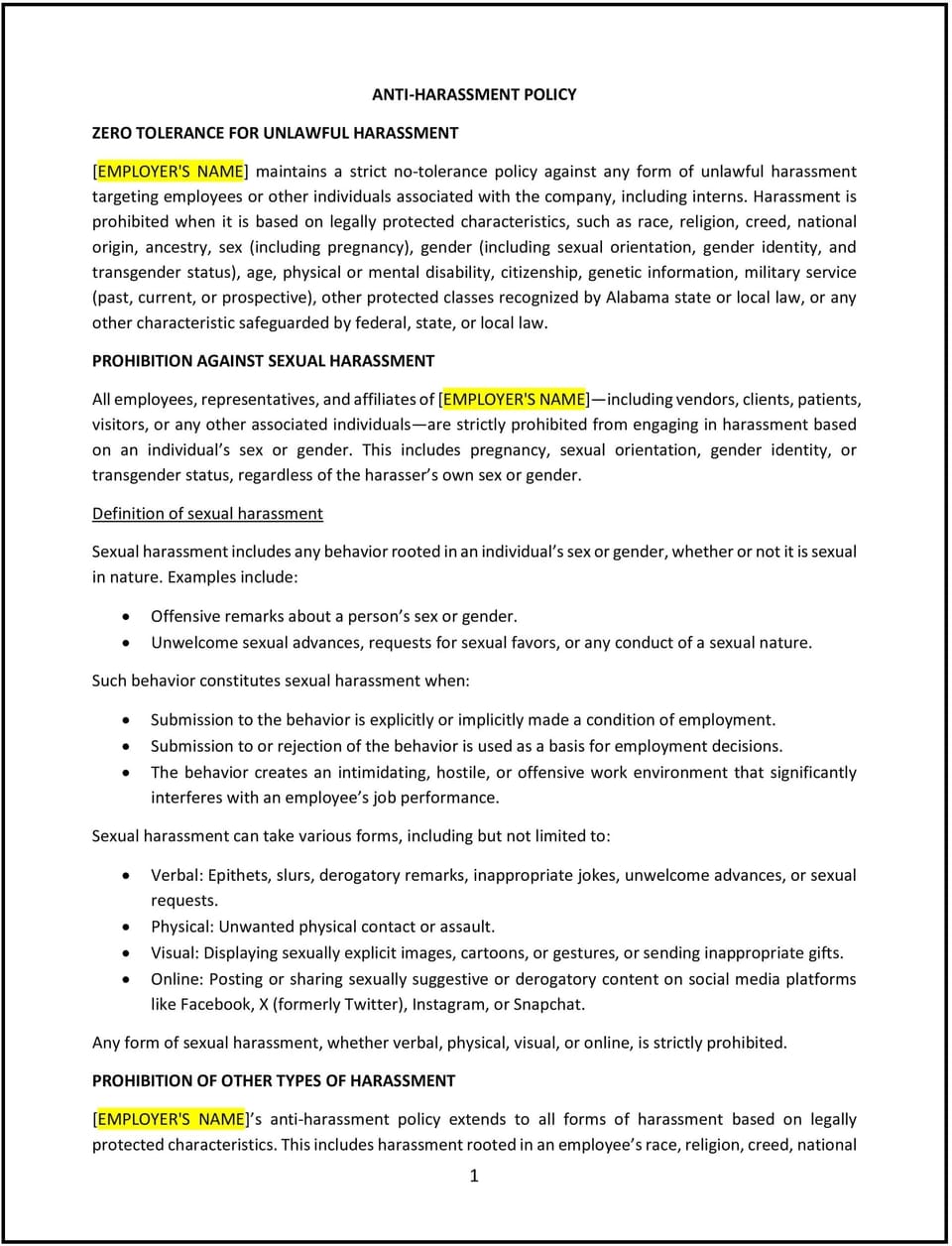Anti-harassment policy (Alabama): Free template

Anti-harassment policy (Alabama)
An anti-harassment policy is essential for fostering a safe, respectful, and inclusive workplace. In Alabama, this policy helps businesses comply with federal laws, such as Title VII of the Civil Rights Act, and ensures alignment with state-specific regulations. Tailoring this policy to your organization demonstrates your commitment to addressing and preventing harassment while protecting your employees and company reputation.
How to use this anti-harassment policy (Alabama)
- Define its purpose: Emphasize your commitment to maintaining a harassment-free workplace and complying with Alabama and federal laws.
- Customize for your workplace: Adapt the policy to reflect your company’s reporting structure, disciplinary procedures, and communication channels.
- Outline reporting processes: Provide employees with clear, confidential ways to report harassment without fear of retaliation.
- Train your team: Conduct regular training sessions to educate employees on identifying and preventing harassment.
- Monitor and update: Regularly review the policy to ensure it reflects changes in Alabama’s legal landscape or organizational practices.
Benefits of using an anti-harassment policy (Alabama)
A comprehensive anti-harassment policy protects your business and promotes a positive work environment. Here's how it helps:
- Promotes a respectful workplace: Establishes clear expectations for behavior and accountability.
- Ensures compliance: Aligns with Alabama and federal laws, reducing the risk of legal claims.
- Encourages reporting: Provides employees with safe, confidential mechanisms to address concerns.
- Reduces workplace conflict: Helps resolve issues before they escalate, improving team cohesion.
- Strengthens employee trust: Demonstrates your commitment to creating a safe and supportive work environment.
Tips for using an anti-harassment policy (Alabama)
- Include examples: Provide specific examples of prohibited behaviors, such as verbal, physical, or visual harassment.
- Designate contact points: Assign trusted individuals or HR representatives as primary contacts for reporting harassment.
- Emphasize confidentiality: Reassure employees that all reports will be handled with discretion.
- Address Alabama-specific risks: Consider industries like manufacturing or healthcare, where unique workplace dynamics may arise.
- Document responses: Maintain thorough records of reported incidents and actions taken to ensure transparency and accountability.
Q: What is workplace harassment?
A: Any unwelcome behavior based on race, gender, religion, or other protected categories that creates a hostile work environment or violates legal protections.
Q: Is an anti-harassment policy required by law in Alabama?
A: While not explicitly mandated, having a policy helps comply with federal laws and demonstrates a proactive approach to workplace safety.
Q: How can employees report harassment?
A: Employees can report concerns through confidential channels, such as HR representatives, anonymous hotlines, or designated email addresses.
Q: Does the policy apply to remote workers?
A: Yes, the policy applies to all employees, including remote workers, to ensure a respectful environment across all work settings.
Q: How often should the policy be reviewed?
A: Review it annually or whenever there are updates to state or federal laws affecting harassment protections.
This article contains general legal information and does not contain legal advice. Cobrief is not a law firm or a substitute for an attorney or law firm. The law is complex and changes often. For legal advice, please ask a lawyer.


